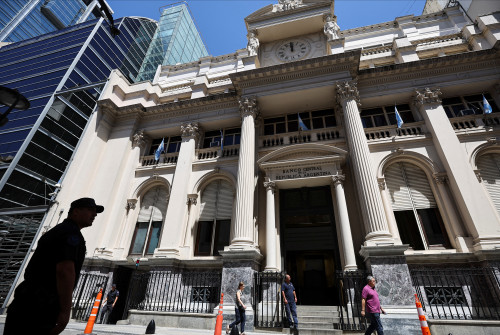By Steve Scherer and Ismail Shakil
OTTAWA (Reuters) – Canadian businesses still see inflation running high before edging down slowly, the Bank of Canada said on Friday in a second quarter survey at a time when labor market and wage pressures are seen easing.
Most businesses expect to hire over the next year, but fewer than in the first quarter and about half the number of a year ago. Those seeking to hire expect a labor shortage to be less intense than in previous quarters.
More firms see their input costs declining over the next year along with prices of what they sell, but most still expect inflation to remain above the 2% target until at least 2025.
More firms think it will take five years or more for inflation to near the Bank of Canada’s (BoC’s) 2% target than thought so in the first quarter.
“That’s not a reassuring development for monetary policy makers,” Royce Mendes, head of macro strategy at Desjardins Group, said of businesses’ inflation expectations.
“Even though both supply and demand conditions are normalizing, it’s happening at a snail’s pace.”
That may be too slow for the central bank. After a five-month pause, the BoC this month raised rates to a 22-year high of 4.75%. Most analysts and money markets expect another 25-basis-point hike either next month or in September.
After this month’s increase in borrowing costs, the BoC said monetary policy was not sufficiently restrictive and it will look to economic reports like the business survey to determine whether more hikes are needed.
Earlier on Friday Statistics Canada said the country’s economy probably gathered pace in May after stalling in April, leaving the door open for the BoC to hike interest rates on July 12.
According to a separate survey of consumers, expectations for inflation for the next year eased to 5.09% in the second quarter from 6.03% in the previous quarter.
“While inflation expectations were broadly lower, they remain well above consistent with the BoC’s 2% target,” said Benjamin Reitzes, managing director and macro strategist at BMO Capital Markets.
Slightly fewer consumers than in the first quarter expect a recession and have grown somewhat more optimistic.
“Although half of respondents still expect a recession in the coming year, consumers’ confidence about the future of the economy has improved as their inflation expectations have lowered,” the consumer survey said.
Returning to the business survey, only a third of businesses expect a recession over the next year, compared to half of those surveyed in the first quarter.
Businesses also have moderated views on wage growth. Wages are still expected to grow over the next year, but the second-quarter number is a third of what it was a year ago.
“Although labor shortages remain common in some sectors, pressures on the labor market are easing due to decreased competition for workers and increased labor supply,” the report said. “Firms expect growth in their wages to moderate from high levels.”
(Reporting by Steve Scherer and Ismail Shakil; Editing by David Gregorio)





